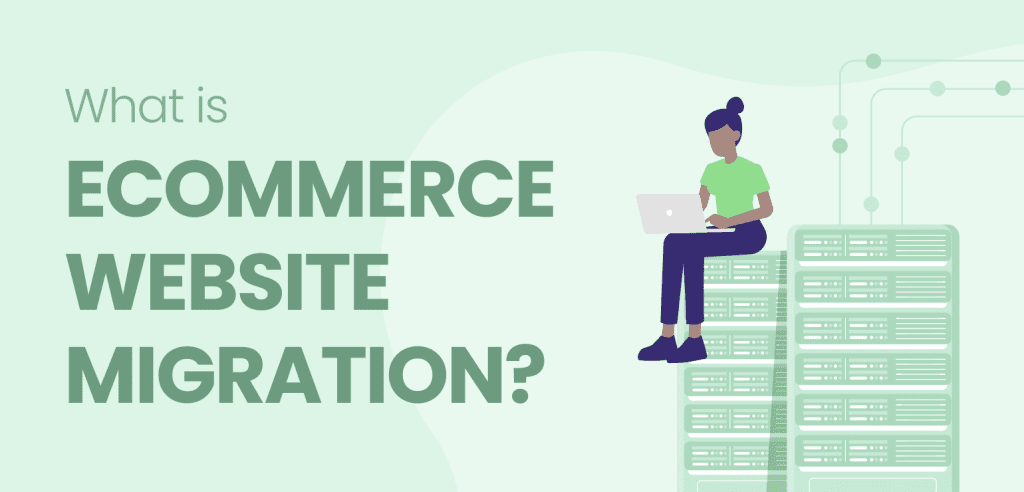What is eCommerce Website Migration?

Article topics
- Why Migrate an eCommerce Website?
- Different Approaches to eCommerce Migration
- eCommerce Rehosting
- Rehosting Considerations
- Types of eCommerce Hosting
- Virtual Private Server (VPS)
- Managed Dedicated Server
- In the Cloud
- eCommerce Replatforming
- eCommerce Platforms
Migration is an umbrella term used to describe methods of moving an eCommerce website from one platform to another, to a new host, or both.

Why Migrate an eCommerce Website?
In recent years eCommerce has changed significantly: technology has developed, eCommerce take-up is booming, and there’s been a marked shift in consumer expectations.
The continued rise of eCommerce, and its ongoing evolution, presents a challenge for businesses. For ongoing growth and to remain competitive, companies that use eCommerce must:
- Ensure consistently high performance – faster page load speed
- Deliver seamless consumer experiences – improve UX, particularly on mobile
- Maintain operational flexibility and scalability – to meet market demands, for business agility and growth
Migrating to a new, higher performance eCommerce platform or new hosting solution can also improve omnichannel operations, increase resilience and strengthen security against data breaches and DDoS attack, particularly when migrating to cloud architecture.

Different Approaches to eCommerce Migration
eCommerce Rehosting
Rehosting is the process of moving an existing eCommerce website from one server to another. That might be from physical server to physical server, or switching from a server to a cloud environment, such as Amazon Web Services (AWS).
Sometimes referred to as ‘lift and shift’ migration, rehosting does not impact a website’s operations or design, but performance and resilience will be improved.
Rehosting Considerations
Rehosting is, compared to other migration methods, more straightforward with minimal application or business disruption. Because there are no major changes to the website itself, rehosting is often faster and cheaper than other migration methods, such as replatforming.
An obvious concern with rehosting, as with replatforming, is things going wrong during the process, leading to operational issues post migration. Because of the technical specialism needed, choosing an experienced migration service provider to manage the rehosting will ensure the process is well planned and executed.
Rehosting an existing eCommerce website from a physical server to the cloud could mean that because of existing website limitations it may not be possible to use new features offered in the cloud.
Types of eCommerce Hosting
Virtual Private Server (VPS)
VPS hosting gives websites a dedicated space on a shared physical server, located in a controlled environment on a provider’s premises.
Managed Dedicated Server
Using a dedicated server gives greater control of a website’s performance. This will eliminate potential performance fluctuations caused by other tenants on a shared server.
Managed dedicated servers are maintained and supported by a hosting services provider.
In the Cloud
Cloud hosting gives eCommerce websites high availability, providing increased resilience with auto scaling to meet fluctuating load demands.
One of the best-known cloud hosting providers is AWS. Rehosting in AWS, from WordPress for example, offers higher performance hosting in a virtual environment.

eCommerce Replatforming
An eCommerce platform is the software application that enables online trading—covering everything from customer experiences to back-office functionality and analytics.
Simply put, replatforming means the process of relocating a business, including website and operations, to a more powerful platform.
Platforms provide the architecture to run a business without having to create an eCommerce software system from scratch, making design and development faster and cheaper.
Elements of a replatformed website will be improved and new functionality added, while data from the old platform is preserved (content, product information, SEO structure, databases etc).
There are many eCommerce platforms offering solutions that will fit any type or size of business. Which one best suits a particular business depends on a number of factors, such as business size and complexity, sector, business goals, products or services, and business model.

eCommerce platforms
Different platforms offer a range of functionality and features, with varying levels of complexity. Some popular eCommerce platforms are:
Magento
Magento is one of the most popular platforms around today. There are 250,000+ Magento businesses around the world, representing 10% market share of the top million eCommerce websites. Magento offers eCommerce solutions for medium to enterprise level businesses.
WooCommerce
WooCommerce is a platform created using WordPress, the CMS that powers 34% of the web. It’s a tried and trusted solution, used for more than 2 million eCommerce websites. WooCommerce is ideal for SMBs.
Shopify
Shopify is a simple cloud eCommerce platform for SMBs, with Shopify Plus offering a comprehensive platform for enterprise retailers. Shopify enables the creation of high performance websites backed by powerful tools and excellent functionality.
Sylius
Sylius is an omnichannel eCommerce platform designed to be highly customisable. Sylius is an opensource, headless platform that can easily accommodate integrations, with unlimited scalability.
Takeaway
When we talk about eCommerce migration the terms: migration, rehosting and replatforming are often used interchangeably. For example, a business that’s replatforming a website will often rehost too. And we take for granted that switching to a new platform will mean new hosting.
Rehosting and replatforming are both types of migration. And that while rehosting is sometimes done on its own (from physical server to cloud), replatforming usually includes rehosting as part of the process.
Summary
- eCommerce migration can refer to rehosting, replatforming, or both
- Rehosting can be done on physical servers or in the cloud (that’s where the eCommerce platform resides)
- An eCommerce platform is a software application that provides ready-made architecture to create an online store
- Companies choose to migrate to improve website performance, scalability and resilience, often redesigning elements to improve UX and functionality
- eCommerce migration can be, when using an experienced migration specialist company, relatively quick and inexpensive (depending on business size, needs and goals)
- All data is preserved during the migration process


 Back
Back
